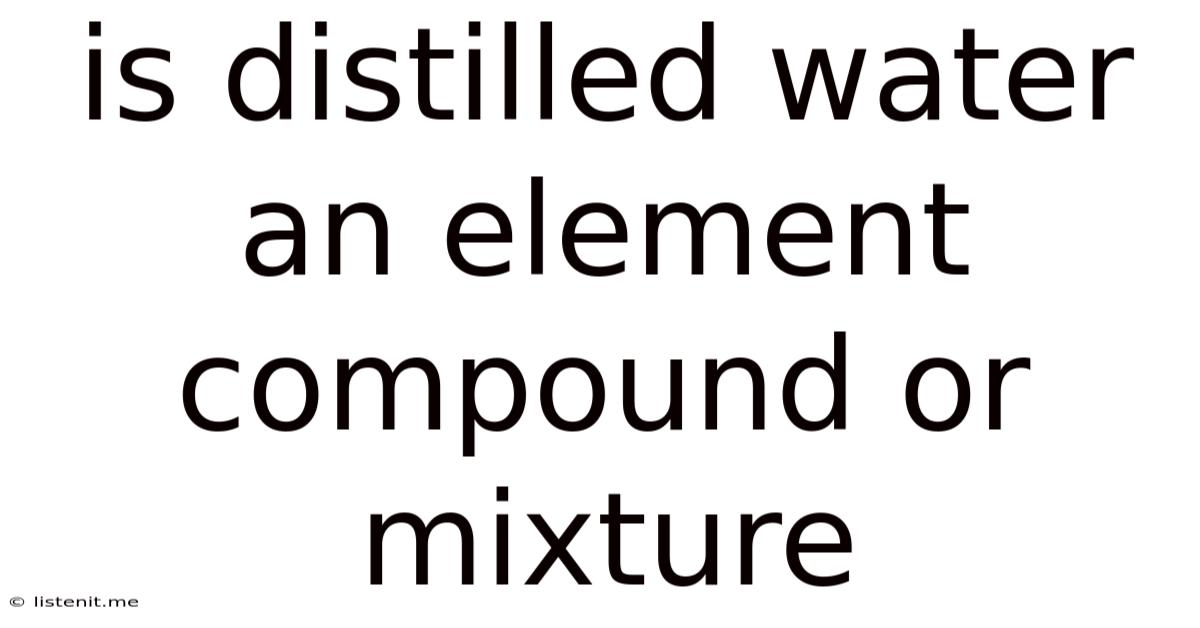Is Distilled Water An Element Compound Or Mixture
listenit
May 12, 2025 · 5 min read

Table of Contents
Is Distilled Water an Element, Compound, or Mixture? A Deep Dive into Water's Chemistry
The question of whether distilled water is an element, compound, or mixture often arises in chemistry discussions. Understanding the answer requires a clear grasp of fundamental chemical concepts. This comprehensive article will delve into the nature of distilled water, exploring its composition, properties, and how it fits into the broader classification of matter. We'll also explore some common misconceptions and clarify the distinctions between elements, compounds, and mixtures.
Understanding the Basics: Elements, Compounds, and Mixtures
Before classifying distilled water, let's define the three fundamental categories of matter:
Elements
Elements are pure substances that cannot be broken down into simpler substances by chemical means. They are made up of only one type of atom. Examples include oxygen (O), hydrogen (H), gold (Au), and iron (Fe). The periodic table organizes and displays all known elements.
Compounds
Compounds are pure substances formed when two or more elements chemically combine in fixed proportions. These elements are bonded together through chemical bonds, resulting in a new substance with properties distinct from its constituent elements. Water (H₂O), for instance, is a compound formed from the chemical bonding of two hydrogen atoms and one oxygen atom. The properties of water are vastly different from those of hydrogen gas and oxygen gas. Compounds can only be separated into their constituent elements through chemical reactions.
Mixtures
Mixtures are combinations of two or more substances that are physically combined but not chemically bonded. The components of a mixture retain their individual chemical properties, and their proportions can vary. Unlike compounds, mixtures can be separated into their constituent parts using physical methods like filtration, distillation, or evaporation. Examples include saltwater (a mixture of salt and water), air (a mixture of various gases), and salad dressing (a mixture of oil, vinegar, and spices).
The Composition of Water: A Closer Look at H₂O
Water (H₂O), the substance at the heart of our discussion, is a compound. It is formed by the covalent bonding of two hydrogen atoms and one oxygen atom. This bond involves the sharing of electrons between the atoms, creating a stable molecule with unique properties. The properties of water, such as its high boiling point, surface tension, and ability to act as a solvent, are a direct result of this chemical bonding. You cannot physically separate hydrogen and oxygen from water without a chemical reaction.
Distillation: A Purification Process
Distillation is a physical separation technique used to purify liquids. It involves boiling a liquid and then condensing its vapor. Impurities, which typically have different boiling points than the target liquid, are left behind during the process. In the case of distilled water, the process removes dissolved minerals, salts, and other contaminants from ordinary water.
The key takeaway here is that distillation is a physical process, not a chemical one. The chemical composition of the water molecules themselves remains unchanged. The process only removes other substances mixed with the water.
Why Distilled Water is NOT a Mixture
Given that distillation purifies water by removing impurities, one might mistakenly consider distilled water a mixture. However, this is incorrect. After distillation, the remaining substance is still chemically pure water (H₂O). It consists solely of water molecules, with no other substances chemically bonded to them.
While the source water might have been a mixture, the process of distillation isolates and concentrates the water molecules, effectively removing the other components. The end product, distilled water, is a pure compound, not a mixture.
Common Misconceptions about Distilled Water
Several misconceptions surround distilled water:
-
Distilled water is "empty" or devoid of properties: This is false. Distilled water still retains the chemical properties inherent to water molecules, such as its polarity and ability to act as a solvent. It's just free from impurities.
-
Distilled water is unhealthy: While distilled water lacks essential minerals found in tap water, it is not inherently unhealthy. The absence of minerals is often exaggerated. The human body obtains minerals from food, not drinking water. However, prolonged consumption of only distilled water might have some minor implications depending on your overall diet.
-
Distilled water is only used in laboratories: While commonly used in labs, distilled water has various applications, including in car batteries, irons, and certain medical procedures.
Further Considerations: Trace Impurities and Deionized Water
While the ideal definition of distilled water involves only water molecules, in reality, trace amounts of impurities might remain. The effectiveness of the distillation process depends on factors like the equipment used and the initial water quality. Furthermore, deionized water, another type of purified water, is produced using ion exchange resins, a different method than distillation. Both types are generally considered pure but represent different purification methods.
Conclusion: Distilled Water – A Pure Compound
In conclusion, distilled water is a pure compound. The distillation process is a physical separation technique that removes impurities from water without altering the chemical composition of the water molecules themselves. While it may contain trace impurities in practice, its essential nature remains that of a pure chemical compound, H₂O. Understanding this distinction is crucial for comprehending the basic principles of chemistry and the nature of matter. The common misconceptions surrounding distilled water highlight the importance of accurate scientific understanding and separating fact from fiction. The unique properties of water, even in its purified form, continue to make it a fascinating and essential substance for life on Earth.
Latest Posts
Related Post
Thank you for visiting our website which covers about Is Distilled Water An Element Compound Or Mixture . We hope the information provided has been useful to you. Feel free to contact us if you have any questions or need further assistance. See you next time and don't miss to bookmark.